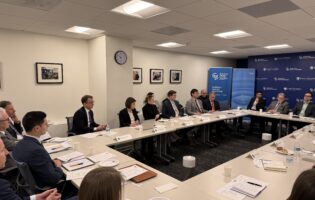Out of Balance: How Journalism Shapes Public Debates on Climate Change
The role of a journalist is constantly changing. On the topic of climate change, that role is especially challenging. The seminar by DAAD/AGI Research Fellow Dr. Michael Brüggemann titled “Out of Balance: How Journalism Shapes Public Debates on Climate Change” focused on the evolving role of journalists in the U.S. and Germany. This is an important topic of study because it is through journalism and the media that the general public gathers much of its knowledge of climate change.
Traditionally, journalists have two roles: interpreting what they perceive as events and processes relevant for publication and moderating the public debate. They thereby help to construct reality, create transparency, and validate conclusions. We have come to expect the norm of objective reporting and truth-seeking from them. But on the subject of climate change, some of these expectations distort the debate.
Climate change is a difficult subject for journalists to work with, especially because of the long-term nature of climate change versus the regular short-term news cycle. It is also an extremely complex topic and multi-dimensional. As a result, journalists in this field often tend to “create” debate to make it more exciting.
Many journalists reporting on climate change pit scientists versus politicians, in an “alarmist vs. denier” scenario. This diminishes the moderator role of a journalist, which takes two equally knowledgeable sources in a balanced debate. It also simplifies the debate, as both sides tend to stay fairly superficial. Journalists include “deniers” in the debate because even though almost all journalists agree with the scientific consensus, they generally seek conflict in order to capture the attention of their audiences. Many journalists also lack the scientific expertise and the time for in-depth research to cover the complex issues related to climate change.
In the online sphere, a broad variety of news outlets have evolved that provide news and commentary on climate change, some of them providing highly specialized expert information while others mix advocacy with journalism. On the positive side, there is more and deeper information available than ever before. Yet, there is also a downside to these developments: The clear political bias of many online media and personalized news feeds allows consumers to stay within their own filter bubbles and affirm their own beliefs rather than engage with other perspectives. This is likely to sustain the highly polarized debate rather than opening new avenues toward dialogue.
Please contact Ms. Kimberly Frank with any questions at kfrank@aicgs.org.
DATE: Thursday, May 15, 2014
LOCATION: AGI, 1755 Massachusetts Ave, NW, Suite 700, R.G. Livingston Conference Room, Washington, DC 20036
Relevant articles:
“Energiewende Fail?” by Jamie Jarmon
“Barreling Toward a Zero-Sum Game: The U.S., the EU, and Russia” by Paul Sullivan
“Energy and Security Risks: A Transatlantic Comparison” – Achim Maas, Max Mutschler, and Paul Sullivan







